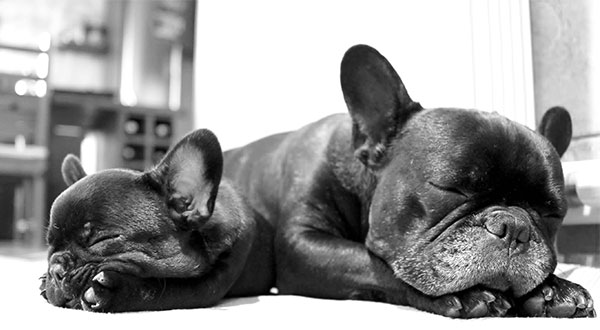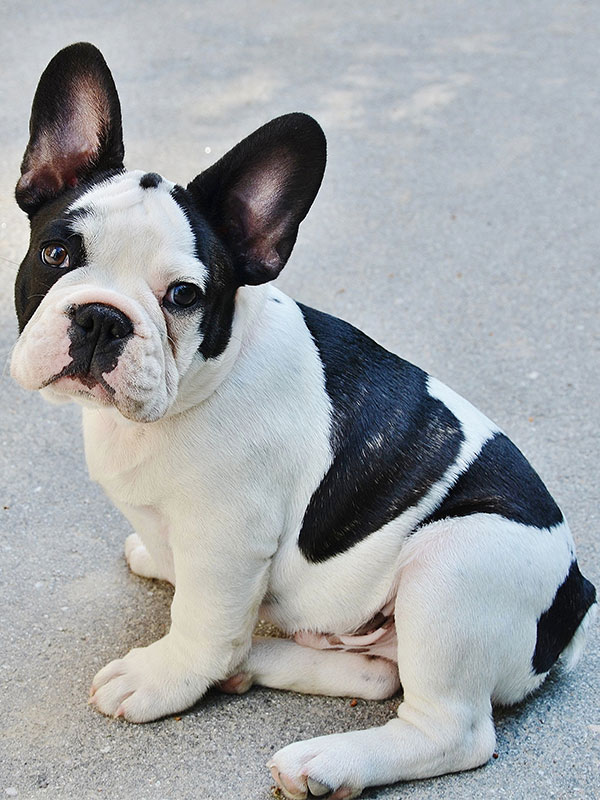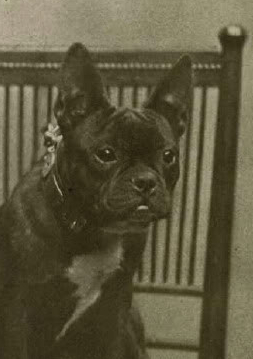
The French Bulldog dog breed has an affectionate, friendly, outgoing personality contained in a compact body. French Bulldog puppies are gentle companion dogs with big bat ears and expressive eyes. They are loyal to their families, and love attention. Today we’ll share fun French Bulldog facts and fascinating breed traits. We’ll learn about French Bulldog puppies’ characteristics and history. Including what French Bulldogs should look like. You’ll have a simple guide to buying, adopting, raising and caring for an adult French Bulldog too.
- Pros and cons of French Bulldogs
- Why do we love Frenchies?
- Are French Bulldogs good family pets?
- Finding a Baby French Bulldog
Happy French Bulldogs have a good level of health, as well as lots of focus from their families. They might be a show dog, apartment pet, lapdog or first time puppy, but either way fitness is key. Helping your toy dog with their weight will improve their predicted lifespan. We’ll also see whether searching for an even smaller French Bulldog like a teacup Frenchie is a good idea. And we’ll look at whether French Bulldogs are clever, and if they are well tempered too. And in case you think maybe a French Bulldog isn’t your ideal pet, we’ll share some similar breed too.
What is a French Bulldog?
The French Bulldog is a popular but controversial breed with a flat face and oversized ears. They weigh up to 25lbs and stand approximately 12 inches tall. The Frenchie dog has a bright and lively personality but is burdened with complicated health problems. These issues include problems with their eyes, breathing, and overheating. All of which are associated with their face shape. Read on for loads more information and for help when it comes to French Bulldog adoption.
- Popularity: 4th in the AKC’s ranking
- Purpose: Lap dog
- Weight: Less than 28 pounds
- Temperament: Friendly and Loyal
This popular, friendly breed has a great appeal. And not just because of their lovely personality. There is a lot more to this little bulldog than meets the eye.
Let’s get to know everything about him before you make your choice.

Popular French Bulldog Questions
Here are our readers’ most popular and frequently asked questions about the French Bulldog. Click on one of them to jump down to the relevant part of the article.
- Why is the French Bulldog so expensive?
- Do French Bulldogs have health problems?
- Are French Bulldogs aggressive?
Why Do People Like French Bulldogs?
French Bulldogs are widely loved because they are cute, compact and characterful. Their flat faces give them almost human expressions, and their loyal natures make their human families feel loved. Being a tiny dog they are incredibly portable. And their low activity level makes them relaxed to be around. Sadly however, some of these things that seem like good characteristics are as a result of health issues.
Baby French Bulldog Pros And Cons
Pros
- They are very cute.
- This is a friendly breed with a lot of love to give.
- They are small and portable.
Cons
- They are extremely prone to health problems.
- These health problems can cause lifelong discomfort and serious distress.
- It is quite possible that caring for this breed will cause you and your family a lot of stress

History and original purpose of the French Bulldog
Despite his name, the French Bulldog is English in origin. When bull and bear baiting became illegal in the 19th Century, the role of the bulldog became that of a companion.
Increasingly smaller dogs were developed to fulfill this new role. It is these dogs from which our modern Frenchie descended. Their oversized ears gained particular favor in France, where they were deliberately bred to exaggerate this feature.
This over-sizing of ears initially caused controversy initially between Kennel Clubs. Over the years the matter was settled though, and the large ears of the French Bulldog seem set to stay. Their popularity has rocketed to unprecedented levels.
Fun facts about the Frenchie Dog
- The Frenchie has become a bit of a celebrity accessory. Notable owners include Dwayne Johnson, Madonna, Reese Witherspoon, Hugh Jackman, Hillary Duff and Lady Gaga
- French Bulldogs have appeared on the silver screen in films as big as Armageddon and Grease!
- One Frenchie dog by the name of Gary even made it on to the red carpet for a Star Wars premiere. He was the late great Carrie Fisher’s beloved pet and was even her social media profile photo!
Let’s take a look at this breed’s iconic looks.
French Bulldog Appearance
Before we dive into the appearance of the Frenchie we know today, it’s important to first understand how we got here.
The Changing Face of the French Bulldog
The rise and rise of the Frenchie is an impressive one. The recent fashion for them in celebrity circles is undoubtedly helping to drive their sudden increase in popularity.
But sadly, it is coming at a serious price for the dogs themselves. Because French Bulldogs suffer from some very serious health problems.
The above French Bulldog in this image was photographed in 1905. You can see that there is some substantial length to his muzzle, and that his nostrils are open. Compare with the modern Frenchies pictured elsewhere in this article. Their nostrils are all but closed, and deep facial skin folds have formed around the muzzle.
Modern French Bulldog Looks
He has large bat-like ears, a very short nose and soulful expression. His build is stocky and he is very short in stature, normally no more than 12 inches tall or weighing 25 pounds.
The French Bulldog has a broad chest and narrow hips. His face is wrinkled, with the top lip overhanging the bottom one in the classic Bulldog pout.
French Bulldog Colors
Frenchie colors are broken down into three categories – brindle, fawn and pied. Brindle French Bulldogs have a mix of black and fawn hairs. They may have a few white hairs too, but the brindle will cover the majority of their bodies.
Fawn French Bulldogs will be entirely fawn in color, with the exception of the face which can be black. Pied Frenchies are mostly white, with patches of brindle or fawn coloring. All of them should have black ‘eyeliner’ around the rims of their eyes, black lashes and black lips.
Other French Bulldog colors
You can also find black, black and white French Bulldogs, black and tan and even blue French Bulldogs, in a variety of patterns and markings.

These colors and combinations of colors are not considered acceptable as far as the Kennel Club’s standards go. Nonetheless they have still proven very popular with pet dog owners.
If you don’t care about your ability to show a Frenchie in the ring, then it really doesn’t matter what color his coat is. Although there have been some associations drawn between blue Frenchies and poor health.
French Bulldog Color Warning
While some colors may be desirable to you, it’s important not to seek out these colors to the detriment of the breed. Avoid puppy farms even if they do promise to breed for the color you like. You can read our articles on Frenchie colors here:
- French Bulldog Colors
- Blue French Bulldog
- White French Bulldog
Frenchie Coats
The fur itself is short, smooth and easy to manage for his owner. Needing just a casual grooming session with a bristle brush once a week, as long as he hasn’t got mucky in the meantime.
Fortunately, their gentle nature means grooming should be an enjoyable activity for you both. Compared to other dogs, Frenchies don’t shed much. You can read all about it here.
Mini Frenchies
You may have noticed a trend of miniature versions of dog breeds becoming popular. In the case of the Frenchie, there is no official tiny breed. There are mini Frenchies that are cross breeds between a French Bulldog and a toy breed.You can read more about them here.
French Bulldog Temperament
French Bulldogs are bred as lap dogs, and are friendly to their family and willing to please. The typical temperament is very loving and loyal. They are often keen on being petted, and will happily curl up and sleep on your lap. Although small, this breed has the active mind of a dog.
They are intelligent creatures, who require mental stimulation despite their easy-going appearance. Just like any larger breed of dog, Frenchie dogs benefit from structured, positive reinforcement training from a young age.
It’s important to well socialize a Frenchie puppy as although laid back, they can display guarding behaviors towards strangers or visitors.
Make sure to get your pup used to meeting a lot of different people, especially children. Make sure that any visiting children are aware that they should treat the dog like any other. Despite being the size of a toy they certainly shouldn’t be mishandled.
Training and exercising your French Bulldog
A Frenchie puppy will need potty training and to learn to come when they are called. There are lots of other fun things you can teach your pup, but it’s important to take into account their exercise needs.
These dogs are particularly prone to overheating and breathing issues, due to the structure of their faces.
It is really important not to over-exercise this breed as a result of these overheating and breathing issues. French Bulldogs and other brachycephalic dogs are prone to heatstroke because they cannot access enough oxygen to keep them cool and refreshed.
While it’s important to train your Frenchie dog to be sociable, it is not recommended to make these dogs exert themselves too much physically.
French Bulldog Health and Care
If you are thinking of bringing a Frenchie puppy into your home and your heart, then this is the most important section of this article that you will read.
French Bulldog health is a distressing topic for any dog lover to go into. Because they are in serious trouble.
All breeds of pedigree dogs have some health problems common to their type.
This is because they have a deliberately restricted gene pool. This makes it more likely for nasty recessive diseases to rear their heads.
Fortunately, these days many pedigree health issues can be avoided by only buying a French Bulldog puppy from health tested parents.
There are some diseases which can sometimes affect French Bulldogs that we can use health screening to avoid.
Avoidable French Bulldog Health Problems
- French Bulldog parents should have general eye checks to make sure that their eyes are in good health.
- There is a DNA available to check for hereditary cataracts, which can be a problem in French Bulldogs.
- Frenchie dogs can also suffer from a disease called Von Willebrand’s Disease, which is similar to hemophilia in humans.
- Hip dysplasia can also occur in French Bulldogs, but hip scoring is available. Any breeding pair of Frenchies should be hip tested, and the scores made available to any potential puppy purchasers.
So, several of these health problems can be avoided or reduced by sensible puppy purchasing.
Unfortunately, other issues are so ingrained into the body structure of the breed that they are impossible to avoid.
Major Health Concerns
Let’s take a look at some serious health problems that will impact your puppy, if you choose to bring a Frenchie home.
And what you could do to help your puppy avoid them.
Dwarfism in the French Bulldog
Research suggests that over half of Frenchies suffer from a form of dwarfism called chondrodystrophy. Chondrodystrophy creates features that are considered desirable by breeders, but this characteristic appearance comes at a price.
It can lead to a number of issues including back problems, malformed hips and oversized heads relative to their bodies.
Having oversized heads combined with narrow pelvises are of the reasons many French Bulldogs are unable to give birth naturally. Pregnant female French Bulldogs usually need their pups to be delivered by caesarian section – which partly explains the high price breeders ask for the puppies.
High incidence of hemivertebrae and premature disc degeneration are seen in this breed. Problems relating to chondrodystrophy are impossible to avoid entirely when picking a French Bulldog puppy. All Frenchies have this type of dwarfism.
When you buy a Frenchie, you will have to accept that it will probably never have a natural birth, and that they may suffer from severe back or gait problems down the line.
Another potential problem in a related area is with French Bulldog tails.
French Bulldog Tails
The breed standard calls for French Bulldog tails to be short and undocked. But of course, nature made dogs with long tails originally.
And when short tails occur, they also bring along problems, especially when they are in the form of screw tails. The problems with screw tails can be very severe, causing spinal problems and defects in the dog.
These can cause mobility problems, and when these screw tails occur they can even compress a duct and cause impacted anal glands.
You can find out more about screw tails and hemivertibrae here.
If you buy a Frenchie puppy, then make sure that their parents both have protruding tails. And ask the breeder about any history of back, mobility, or anal gland problems.
These are nasty conditions, but probably not the most worrying one that all French Bulldogs have to deal with.
That comes from the way the French Bulldog’s face is constructed.
Flat Faced Dogs
One of the factors many people find appealing about French Bulldogs are their flat faces.
The set of their eyes and reduced muzzle size give them a more human, baby-like appearance. This face shape is something which has been bred into dogs quite rapidly over recent years.
The Frenchie dog face has not evolved naturally, but has been designed by the deliberate breeding together of dogs with smaller and smaller muzzles.
If you look at the 1905 photograph earlier in the article, you can see that whilst the bulldog’s muzzle is small it is still definitely pronounced.
The dog has a prominent nose, open nostrils and tight skin. Take a look at the difference in this dog’s profile:
His nostrils are practically closed, and his face is surrounded by folds of skin which lack the muzzle bones to support them. It has caused the French Bulldogs some very serious health problems. Because dogs need muzzles.
Brachycephaly
Like their Bulldog cousins, Frenchies have become increasingly flat faced over the last few decades.
Flat faced dogs are referred to as ‘brachycephalic’, and this condition is linked to a number of health issues.
These health conditions are grouped together under the heading brachycephalic airway syndrome.
What Will Brachycephaly Mean For Your Puppy?
Brachycephalic puppies have short facial bones, but the same amount of facial tissue as a dog with a normal length muzzle.
This means that there is too much tissue inside the dog’s mouth. More tissue than the muzzle has space for.
In many cases the dogs palate may block the airway so severely that surgery will be necessary to save him from respiratory distress.
His eyes can also be affected, because the proportion of his skull won’t accommodate his eyeballs.
This leads to the eye being improperly hydrated, and causes corneal ulcers. These are as nasty as they sound.
You can find out more about brachycephalic ocular syndrome here.
Narrow Nostrils
Affected dogs also have narrow nostrils. You will often see on pictures of Frenchies that the nostrils are barely visible. These nostrils are known as ‘stenotic nares’.
Think how hard it is to breathe when you have a cold and your nose is blocked? Most French Bulldogs feel like this every moment of their lives.
Not only is this uncomfortable, but it means that your dog’s ability to get enough air is compromised.
He can’t oxygenate himself. Nor can be effectively cool himself down. He overheats easily. So he can’t run very far, or cope when the weather is hot.
The cute snuffly noises that French Bulldogs make are actually due to their inability to gather breathe efficiently.
Tricky Surgery
French Bulldogs are also very hard for veterinarians to intubate due to their physiology.
This means that if they do require anesthetizing for an essential surgery, this can be very hard to do.
This is not something that affects just a few French Bulldogs. All brachycephalic dogs have compromised airways to some extent.
And many are severely affected.
Low Energy Dogs
French Bulldogs are among those breeds often described as low energy dogs. But what does that mean? In the case of the brachycephalic dogs, low energy means exactly that. Low energy.
Not because the dogs are not interested in continuing to run and play whatever the weather, like their muzzled cousins. But because they rapidly run out of the energy to do so.

French Bulldogs have low energy because they are not able to get enough oxygen into their tiny bodies. Have a think about why you want to share your life with a low energy dog.
If you desperately want a dog but hate exercise, then consider rescuing a dog who has a health problem rather than buying into a trade of deliberately breeding disabled dogs.
If you are shocked by the comment above, it might be because you have heard that some dogs are simply low energy dogs anyway.
You may have heard that it’s ‘normal for the breed’. So let’s take a look at what that actually means.
Normal For The Breed
You will often hear the phrase ‘normal for the breed’ used to justify health problems.
“It’s okay that my dog can’t breathe properly, it’s normal for the breed.” Or “Don’t worry about the fact she couldn’t birth the puppies without surgery, it’s normal for the breed.”
Normal for the breed means that most members of that group of dogs show the same characteristic. The reason for this is that a breed is produced from a select number of dogs by people who want to exaggerate or retain certain features.
These features are decided and agreed upon by humans, who then deliberately set out to produce them. This process produces certain characteristics which are desirable to breeders, and when most dogs have them, they become normal.
But when normality means a life of misery, then ‘normal for the breed’ is not a justification. It’s just a fact.
Just because it’s normal, doesn’t make it right
Yes, it is normal for a French Bulldog to be unable to run around like his long snouted friends.
And to need urgent access to shade when the day grows hotter so that he doesn’t collapse. It is normal. It is not okay.
Even the breed standard image used to illustrate their ideal for the French Bulldog breed by the AKC is concerning. The dog pictured has closed nostrils.
It is an image demonstrating what is normal for the breed, but it is a seriously undesirable characteristic when it comes to the health of the dog.
If someone tells you something you know to be a bad thing is normal for the breed, then sadly you need to start looking at another breed.
Alternatively, look for a breeder who wants to move away from this misconceived normality, to something better.
French Bulldog Lifespan
The average Frenchie lifespan is nine years.
This is according to a wide ranging survey of purebred dogs and their mortality in the United Kingdom.
You can read more about Frenchie lifespan here.
French Bulldog Care
When caring for a French Bulldog you will need to take into account that this is effectively a disabled dog, with a lot of special needs.
Make sure that you are prepared to monitor and limit your dog’s exercise, especially in warmer weather.
You must also check his eyes daily, to make sure they are not too dry or injured.
French Bulldog care isn’t always pleasant. Be aware that you might have to wipe his bottom for him on occasion. Some Frenchies can’t reach their own behinds, and their tails can get mucky if they are screwed.
Wipe his skin folds on his face regularly to avoid dermatitis and infections. You can use cotton wool and boiled water, or buy packs of wet wipes for dogs.
Due to their body shape, some French Bulldogs are also unable to swim.
Do French Bulldogs make good family pets
In terms of personality, the Frenchie has the potential to make a great family pet.
But when it comes to health, they have a lot of potential problems.
Aside from the financial burden of having to pay extra vet bills, the emotional cost of owning a French Bulldog as a family pet must be taken into account. This will not be a healthy dog, and may cause some degree of upset for your family.
You could say the French Bulldog price is twofold, financial and emotional.
For most families, the lifelong discomfort of most Frenchies is a deal breaker.
Rescuing a French Bulldog
If you have your heart set on owning a French Bulldog, then why not rescue a Frenchie?
Whilst an older French Bulldog will still have some of the veterinary needs of their younger friends, you will at least have some idea of the extent of the severity of their problems when you bring them home.
Frenchie adoption should be an attractive option if you have your heart set on this breed. French Bulldog adoption takes a little bit away from the practice of supporting breeders and so is a relatively good thing.
You can jump to our list of Frenchie rescues by clicking here.
By rescuing an older French Bulldog you will get the breed your heart desires, without adding to the trade in brachycephalic pets.
Finding a French Bulldog puppy
French Bulldogs are a popular breed so they shouldn’t be difficult to find. However, it is so important to avoid buying a French Bulldog from puppy mills and pet shops. Pet shops will in all likelihood source their dogs from farm.
Puppy farms are a blight on society and make a profit by raising dogs in terrible conditions. Both the parents and pups have a terrible life and may come with a whole host of health and socialization problems.
As you’ve already read, Frenchies don’t need any more bad luck with their health.
If you are wondering what the best way to find a Frenchie is, consult our puppy search guide.
Raising a French Bulldog puppy
If you have already brought your puppy home, then you will need to take special care of him.
Make sure you have regular appointments with your vet to check their breathing.
Do not exercise him on hot days, walk too far and always watch his tongue.
Pup’s tongues are a good clue to their breathing difficulties. They should lie flat. If they curl up at the tip then they are struggling.
Caring for a vulnerable French Bulldog puppy is a big responsibility. There are some great guides in our Puppy Care Section to help you with all aspects of puppy care and training.
Why are French Bulldogs so expensive?
There are several factors that contribute to French Bulldog price. More popular dogs get higher prices, because people are prepared to pay them.
But Frenchies are also pricey because it’s not easy to breed them. They often cannot birth naturally, and this operation is costly.
If the breeder health tests and feeds the puppies on high quality food, this will also contribute to the price.
Frenchie price isn’t just a financial thing. The emotional cost of raising and caring for a defective breed can be staggering.
One way to potentially reduce the chances of some Frenchie health issues is to consider a mix.
Popular French Bulldog breed mixes
Whether your mix will be healthier is partially down to what they are crossed with.
But there is a fair amount of chance in there too.
Make sure you get to know your potential cross breed well before making your choice.
- Boston Terrier French Bulldog Mix
- French Bulldog Pug Mix
- French Bulldog Pitbull Mix
Here’s how the Frenchie fares in comparison with other breeds.
Comparing the French Bulldog with other breeds
Frenchies are regularly compared with other similar breeds. Here are some popular options that potential owners consider comparing.
The issue here is that all of these breeds are brachycephalic. Their shortened skulls causing many of them horrible health problems.
- French Bulldog vs English Bulldog
- Boston Terrier vs French Bulldog
- Pug vs French Bulldog
You would be right to worry about this breed’s health concerns. Let’s look at some personable breeds with fewer health defects.
Similar Breeds
Before committing to owning a French Bulldog, you may like to consider inviting one of these other dog breeds into your family:
- Springer Spaniel
- Jack Russell Terrier
- Yorkshire Terrier
- Maltese
- Whippet
- Beagle
- Maltipoo
- Miniature Boxer
So, let’s weigh up the pros and cons we’ve learned so far.
French Bulldog products and accessories
Links to our relevant product reviews go here
As small dogs prone to breathing problems, Frenchies benefit from some specially selected equipment.
- Best French Bulldog Harnesses
- Top Foods For French Bulldog Puppies
- Best Dog Food For French Bulldogs
As promised, here is our list of Frenchie rescues.
French Bulldog Breed Rescues
USA
- Bulldog Haven NW
- French Bulldog Rescue
- SNAFU Rescue
- Chicago French Bulldog Rescue
-
UK
- Phoenix French Bulldog Rescue
- French Bulldog Rescue GB
- French Bulldog Club of England
-
Australia
- Frenchie Rescue & Adoption of Victoria
-
Canada
- Force Majeure French Bulldogs
- French Bulldog Rescue Canada
- Eastern Canada French Bulldog Rescue
This article has been extensively revised in 2019. Do you have a Frenchie or any thoughts on this breed? Let us know in the comments.
References And Resources
- Gough A, Thomas A, O’Neill D. 2018 Breed Predispositions to Disease In Dogs and Cats. Wiley Blackwell
- O’Neill et al. 2013. Longevity and Mortality of Dogs Owned In England. The Veterinary Journal
- Schalamon et al. 2006. Analysis of Dog Bites In Children Who Are Younger Than 17 Years. Pediatrics
- Duffy D et al. Breed differences in canine aggression. Applied Animal Behavior Science 2008
- Strain G. Deafness prevalence and pigmentation and gender associations in dog breeds at risk. The Veterinary Journal 2004
- Packer et al. 2015. Impact of Facial Conformation On Canine Health. PlosOne
- Adams VJ, et al. 2010. Results of a Survey of UK Purebred Dogs. Journal of Small Animal Practice.
- Roedler et al. 2013. How does severe brachycephaly affect dog’s lives? Results of a structured preoperative owner questionnaire The Veterinary Journal.
- O’Neil et al. Epidemiological associations between brachycephaly and upper respiratory tract disorders in dogs attending veterinary practice in England. Canine Genetics and Epidemiology.
- Torrez, 2006. Results of surgical correction of abnormalities associated with brachycephalic airway obstruction syndrome in dogs in Australia. Journal of Small Animal Practice.
- Poncet et al. 2006. Long-term results of upper respiratory syndrome surgery and gastrointestinal tract medical treatment in 51 brachycephalic dogs.
- Packer et al. 2015. Impact of Facial Conformation On Canine Health. PlosOne
- OFA – The Canine Health Information Center




Masud Husen Mamun says
Awesome Info, Thanks for sharing 😃😃😃
French Bulldog says
Hi, a great informative article full of some very good advice. It’s a shame about the breeding of the Frenchie though.
Theodore says
We have french bulldog puppies for sale.The French Bulldog’s motto is “Love the one you’re with.” He is small, with distinctive “bat ears,” and comes in a variety of colors. The Frenchie is adaptable to any home environment, as long as it has air conditioning.
Tracey says
I love Frenchie but we need good people to breed them like in the one’s in 1905. The boxer’s went through the samething it’s a shame.
Lesley Ross says
My 1 year old little treasure Norman is still cutting teath is he a late developer or is the common
Tammy says
I have 2 frenchies my first one has a flat nose and yes she has more difficulty breathing I got her fixed wasn’t having any puppies with her she was my first and I had wanted one for a long time and she was much cheaper Everyone needs to watch out for cheaper people are breeding these dogs to make a easy buck and care nothing about the breed and we are getting a lot of flat noses My 2nd frenchie came from a good breeder who loves her dogs they have a face with no breathing difficulty and very active and yes cost a lot more please save your money help get rid of these people just wanting money I recommend getting a frenchie best dog I’ve ever owned no other breed like them
Luke says
Hi Tammy,
Would you be able to advise where you got your 2nd Frenchie from? We are struggling to distinguish between good and bad breeders…
Cheers,
Luke
Lucy says
Hi Luke, If your heart is set on a Frenchie you need to find a breeder who has had both the parents BOAS tested. A good result is Grade 0. They need to have a protruding tail, wide open nostrils and a longer than average muzzle. Steer away from breeders that use terms such as ‘normal for the breed’, as normal in this breed is unfortunately not a healthy structure at the moment. Best of luck in your search!
jill says
I have a 6 month old frenchie boy…..hes my world , keeps me company , wants lots of love and attention….which i love giving bye the way !!! my poor son and partner have gone down on my love list lol. i don’t work due to mobility problems so i’m home every day to pile lots of love on him…which he adores …thankfully! ….yes ive spent a small fortune on vets bills due to runny stools/allergies{food related ! ) put him on a raw food diet (against the vets advice !) and hes been absolutely fine since! more energy ,lovely solid stools and his farts are less horrendous lol ….and hopefully a longer life without disease ,god he is so adorable and I would pay millions to have him as long as possible! The vet bills are worth it, believe me !
Colleen says
What do you mean by a raw diet? I have a orange tabby cat which I feed blue buffalo wet and science diet dry which I’ve been told is healthy for him. I am really interested in getting a Frenchie one day and want to feed him a good diet to be healthy
Megan says
I feel so lucky that my Lola actually looks more like the 1905 French Bulldog than many of today’s. Her nares are much wider open and she’s got pointier ears. I’m pleased to know that her bloodlines may have missed some of the selective breeding.
JPW BLOCK says
A nine-year old “pied” Frenchie owns me! I have been properly trained to walk on HER leash and be properly behaved since she was ten weeks old! She is the ultimate pillow companion, has had no health problems and is the perfect dog for someone who wants unparalled devotion. She’s a seasoned traveler, is a card-carrying EAD and is obedience trained with some hand signals under her belt. I attribute this fortunate situation to having gotten her from a conscientious breeder who researches every breeding. The Frenchie breed is a magnificent example of how to acquire the ideal lap companion with intelligence, humor and devoted loyalty!
Dee says
Thank you for this article, we have just rescued an 11 month old. Knowing full well that he is going to have problems, he licks his paws he scratches his face. He never complains or wingers but we know it is uncomfortable for him. We love him but he breaks our heart. I don’t think they should be allowed to keep breeding them especially now knowing it isn’t even a natural birth. We are cruel to keep forcing these wonderful creatures into this world.
Becky L Weber says
I totally agree, there are breeders out there that are destroying the breed and producing dogs that will suffer through life just because some people find a flat face adorable. As a breeder of French bulldogs, I strive to produce a happy medium. Cuteness without a totally flat face.
Tami says
Be prepared to adopt a “two year old child” instantly. These dogs require the attention, time, and financial burden of a two year old child. With that being said, they are the most amusing, fun, and lovable of all the dog breeds.
Belinda says
Hi my frenchie is 4 months old. She is adorable. She has developed lines on top of her head that look like hair loss ? Is this normal or could it be skin infection ?
Mariana Kidd says
I read because they carry the blue gene that cause skin illness
Bea says
My frenchie who is now 8 months comes running with me most days, only about 2 miles. Do you think keeping her fit will help avoid breathing problems etc, she thoughly enjoys it & I would take her with me when it is hot.
Bea says
Sorry message should read “would not take her with me if it was hot”
Naralie says
Hi.. i have a blue 5 month old frenchie.. i have noticed whilst videoin & taking pictures her pupils glow purple.. does this mean anything??
Thanks
Mary says
I have a 3 year old frenchie with one flop ear. Can anything be done now?
Kerry says
I have a beautiful fawn frenchie he is 5 months old, I have him trained from about 9 weeks to sit,lie,give his paw, leave treats until I tell him and also toilet trained. He is the most loveable and funny little dog with a great temperament and personality I absolutely adore him .
Carol Richards says
You mentioned that if you don’t want to show your French Bulldog that color shouldn’t matter. There is a reason that certain colors are not allowed.
Black and white with no trace of brindle carries the deaf gene and can produce blue eyed dogs with eye problems.
Liver or chocolate produces yellow eyed dogs which can cause early blindness and juvenile cataracts.
Blue produces yellow or green eyed dogs which can develop blindness. The blue color produces dogs with follicular dysplasia, which is gradual hair loss causing dry scaly skin susceptible to bacterial infections. There is no cure, and the condition becomes increasingly worse. Just because a blue puppy with yellow eyes can see now and has good skin doesn’t mean it won’t lose its sight and develop skin problems later.
I hope this information is helpful. I did lots of research before getting my french bulldog, and the reason certain colors were not allowed was particularly interesting to me. I have a wonderful five year old french bulldog that I adore.
Nicole says
My Frenchie is very active and loves to run! However, in the summer, we, of course, limit that 😉 And knock on wood, he has been healthy and he is now 3. I do have to give him an antacid for some mild reflux, but he is a very happy and healthy boy!
I have also discovered that there are many Frenchies who do agility and some have won MACH awards. But some Frenchies are more laid back and are more stocky, etc and are more lap dogs.
I think one has to do their homework, heavily research and select a breeder that is ethical and has healthy puppies and dogs. A good breeder will never shy away from health questions. It’s a big investment and if any breeder seems offended by many questions posed to them, move on!!!
Frenchies are wonderful, loving, smart, funny dogs. I’m head over heels for mine. But, yes, I definitely believe that you have to raise them properly (as any dog) and imho, must either work from home or be at home their first year of life. I worked at home his 1st year and it was great to be there in order to train him and give him the attention that all puppies deserve and need. <3
Jodi says
I have a 2 yr old brindle that has had nares surgery & soft palate surgery. He would often throw up after eating or drinking. I was told that was normal. It is not normal @ all. He still struggles with breathing, even on mild weather days he can’t walk far. Not to mention the allergies that are now showing up in him. Another common frenchie factor. He has a one of a kind personality & we love our Gus but with sinuc problems myself I feel for him.
Pippa says
Sorry to hear of Gus’s troubles, these are lovely dogs and they deserve better – we wish him well 🙂
Maizey Mae says
French Bulldogs are now experiencing a high rate of brain tumor/ cancers. Life span 4-6 years. Highest vet bills and most frequent visitor to,a,vet.